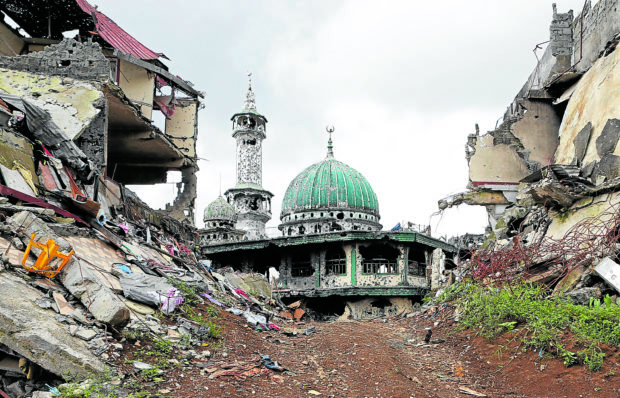
In this photo taken in 2017, the bullet-ridden Mindanao Islamic Center stands amid ruined structures following the five-month war between government troops and Islamic State-linked terrorists in Marawi City. (File photo by JEOFFREY MAITEM / Inquirer Mindanao)
ILIGAN CITY, Lanao del Norte, Philippines — The process of compensating properties lost during the five-month siege in Marawi City in 2017 can now be started after President Ferdinand Marcos Jr. organized the nine-member Marawi Compensation Board (MCB).
Under Republic Act No. 11696, or the Marawi Siege Victims Compensation Act which was signed in April last year, the MCB will oversee the application for compensation, assessment of the lost properties, and payment.
The MCB chair and eight members took their oath before Executive Secretary Lucas Bersamin on Monday, according to the Presidential Communications Office.
Heading the MCB is lawyer Maisara Latiph, who used to be a member of the interim Bangsamoro parliament. The eight members are Sittie Aliyyah Lomondot Adiong, Dalomabi Lao Bula, Mustapha Dimaampao, Jamaica Lamping Dimaporo, Mabandes Sumndad Diron Jr., Moslemen Macarambon Sr., Romaisa Lomantong Mamutuk and Nasser Macapado Tabao.
“Thankful and grateful that finally, the long wait is over,” Drieza Lininding, chair of the Moro Consensus Group, said in a statement to the media.
Lininding appealed to the president “to support the MCB so that it can function very well, like (providing) additional funds since we all know that the initial P1-billion allocation (in the 2023 national budget) is not enough.”
Under the law, compensation is provided to people whose properties were destroyed and who lost their loved ones during the five-month siege by Islamic State-linked militants in 2017.
Also entitled to compensation are those whose properties were demolished during the implementation of the Marawi Recovery, Rehabilitation and Reconstruction Program, including the search for and recovery of unexploded ordnance.
Fair market value
The fair market value of land and lost personal properties and the replacement cost of destroyed structures are the general bases for providing compensation, which will be tax-free.
“No amount of money, of course, can compensate for the losses, (especially of) memories in an almost zombie-like ground zero,” said Maranao civic leader Samira Gutoc, although she said it was a good measure to help residents rebuild their homes.
The nongovernment group Marawi Reconstruction and Conflict Watch (MRCW) said: “Our hopes are renewed by the appointment of members in the [MCB] who are really committed to an independent, inclusive, responsive and gender-sensitive application of the law.”
“MRCW has struggled to ensure that the MCB would be an objective and independent body dissociated from previous failures and corruption,” it added.
The group praised the appointment of five women to compose the board, saying they “bring much-needed integrity into a rehabilitation process that has failed to provide long-suffering victims of the siege with relief and justice.”
“They are well-known in the community, have been acknowledged for their development work, and are truly capable of leading the compensation process,” the group said.